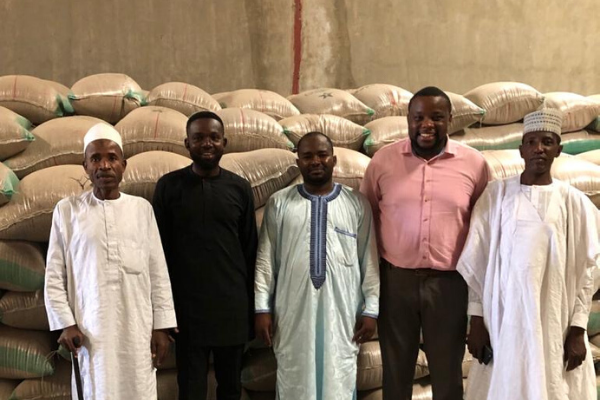
and Babajide Oladipo (second from left) both of OnePort 365 with some
clients in Northern Nigeria.
Exporters and Importers in Nigeria and beyond can now access a revolutionary tech solution that will enable them to streamline local and global trade processes.
For many decades, the freight forwarding industry across Africa has relied on an opaque and outdated system whereby, in many cases, importers and exporters deal with over 20 touch points scattered across various vendors, just to complete a single transaction. The new platform will put a stop to all of that.
Designed by OnePort 365, a digital freight forwarding start-up, the new web-based platform is the outcome of research aimed at easing the unnecessary challenges freight forwarders face.
A chaotic landscape
Industry experts confirm that the huge logistical challenges associated with purchasing or assembling raw materials and finished products, warehousing and transporting them for onward shipment, costs the Nigerian economy billions of Naira annually.
Often, a freight forwarder has to pay for a warehouse that is not immediately needed just to reserve the space, engage a truck driver who may claim to be in Kano while in fact, he is still in Apapa, Lagos on his way back to Kano. There are also cases where cargo that have been billed for onward movement from Nigeria’s hinterland is “stuck in transit” because the driver who was mandated to deliver them is unreachable by telephone.
These are some of the challenges, which OnePort 365’s web-based solution is geared to tackle. Using state-of-the-art technology, the company is providing services that cover inland transportation, shipping, warehousing, Customs brokerage and marine Insurance through its integrated service portal which can be accessed on the OnePort 365 website.
“Infrastructure deficit is a challenge across Africa and many, if not all sectors,” says Hio Sola-Usidame, Lead Partner, OnePort 365.
“Our solution serves to tackle some of these inefficiencies specific to the freight and trade industries. Through the platform, we simplify import and export procedures; provide quick access to quality and vetted cargo transport services at competitive rates; offer real-time tracking of freight for enhanced physical security and comprehensive, tailored customs clearance services performed by licenced brokers to ensure maximum compliance with all relevant Customs regulations.
Reform through technology
The OnePort 365 model is anchored on a desire not only to simplify the import and export process but also to boost economic growth and create jobs. It aims to give exporters and importers more access to the domestic and foreign markets. Accessing the service is simple. By simply registering on the company’s website, businesses can easily access OnePort 365’s platform.
“We built our model around an asset-free structure, by partnering with reliable and vetted vendors on our platform. A similar model to an asset-free uber model”, says Hio.
“By being asset-free, we can remain lean and agile, while using the power of technology to coordinate everyone involved in the value chain to deliver superior service to clients. We have approximately 40 warehouses in our vendor network and all are on a pay-as-you-go model, which means traders can pay for only space and time used as against an annual payment, which results in avoidable waste of resources-+”.
Using the power of technology, OnePort 365 connects haulage equipment and warehouse owners with importers and exporters who are either bringing goods into Nigeria and distributing across the country or those that are accumulating products for onward shipment abroad.
Customers have access to a network of short and long-term warehouse locations, trucks and shipping lines through OnePort 365. They enjoy easy navigation, competitive quotes; book vendors, cargo insurance and Customs brokerage services; track shipment & collaborate online and in real time.
Cargo can be tracked real time from anywhere in the world by simply logging in to view cargo location and progress. The process is completely automated to save resources and deliver efficiency.
The model itself is only new in Nigeria. It has worked elsewhere effectively. Cogoport in India, Flexport in the United States and Freighthub in Germany, are some examples of digital freight forwarding companies successfully operating in developed and emerging markets.
“Our purpose is to usher in a radical change that significantly enhances Africa’s participation in global trade with a complete systemic transformation,” Says Hio, who is not new to this business.
He co-founded Logigrains, a Nigeria Customs Service (NCS) and Nigerian Railway Corporation (NRC) licenced freight forwarding and logistics company in 2016. Over time, Logigrains has become a B2B brokerage firm, providing advisory services to financial institutions and some of the top mining firms in Africa.
At OnePort 365, Hio is responsible for translating the vision of OnePort 365 with direct oversight of company operations, professional services, research and development and strategy. He is a passionate leader and entrepreneur with extensive experience.
Prior to Logigrains, he worked in London with notable firms in the financial and energy sectors. As a commercial advisor in the energy industry, he was responsible for midstream & downstream projects valued at over $2 billion across the United States, the Middle East and West Africa.
Hio is an alumni of The University of Warwick (UK), with a Master’s degree in Business Management and a Bachelor’s degree in Mechanical Engineering. While at University, he was nominated for the Barclays Capital Future Leaders award after the successful establishment of his first business at the age of 16.
“We are simplifying global trade for Africa’s businesses by using our platform to provide end-to-end digital access to seamless freight forwarding. This simplification brings a new level of transparency and optimisation to a largely traditional forwarding market,” he says.
The future
Industry experts say that Nigeria’s freight forwarding industry will be valued at $1billion by 2023. This is against the backdrop of a population growth rate that will continue to drive demand and investment into the freight sector in the near future.
The growing need for trade and distribution makes OnePort 365’s value proposition all important at a time when economic growth remains fragile. In the medium to long-term, OnePort 365’s platform will enhance ease of trade and exchange in Nigeria.
In the last six months, over 500 containers have been booked and efficiently shipped. The cargo shipped vary across various commodities including manganese, zinc, fluoride, sesame seeds, cocoa, cashew, hibiscus, groundnut oil, and resin among others. According to Hio, “our priority is to grow the economy by facilitating seamless trade.”










